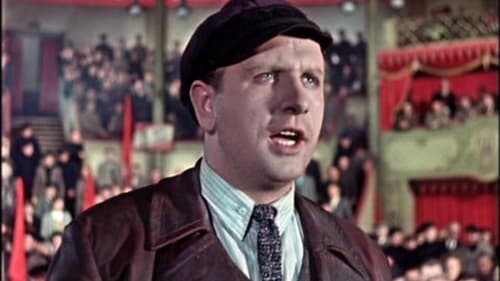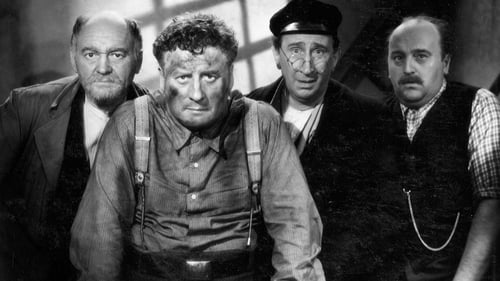Hans Wehrl
出生 : 1905-04-19, Offenbach am Main, Hessen, Germany
死亡 : 1995-10-05

Assmann
A notorious gang of robbers threaten the Ruhr region of Germany in the 1920s.

older worker
Railway employee Fritz Marr is not regarded well by his superiors. It is the year 1920, and trains regularly pass the railway hub of Erfurt to the East to secretly transport weapons for the fight against the young Soviet Union. Marr knows about this and wants to mobilise other workers to stop these illegal deliveries. To muzzle him, Marr is relocated to a remote rail work construction site.

In a casino in a We'5t German health resort, one often sees Sybille - an attractive young student actress. With her winnings from the roulette table, she attempts to finance her studies. Despite a rather lucky streak, her winnings are a little on the lean side. She doesn't, however, gamble with her own money but with that of Dr. Busch, a lawyer, who likes to stay in the background with the argument that gambling houses are not the proper turf for a serious lawyer. From him, Sybille receives only a small share of her winnings later, and only through the intervention of Gerhard Fischer, a journalist, does Sybille come to realize her role in Dr. Busch's fraudulent scheme.

Roman
Early 18th-century Krakow: The poor student Simon works as a travelling musician in order to finance his studies, and the Polish freedom fighter Jan is on the run from Saxon troops. They meet in the carriage of Count Kovalska, where they fall in love with the Count’s daughters Laura and Bronislava.

In 1523, young Thomas Müntzer arrives with his wife Ottilie in the Thuringian village Allstedt to assume the rectorate. As a follower of Luther′s teachings, he finds in the Bible not only reasons for clerical, but also for secular reforms. But when Luther turns away from the rural population after a discord with Müntzer, it is Müntzer who becomes the peoples′ spokesman. He is forced to go to Southern Germany, where he convenes with revolting farmers. But his way leads him back to Thuringia. In 1525, he and Heinrich Pfeiffer form the centre of the Thuringian peasant uprising in Mühlhausen, but their success is diminished by the fact that peasants and craftsmen don′t seem to be able to work together. In Frankenhausen, Müntzer becomes the leader of a peasants′ army that is set to fighting the ruler′s army – and sustains a devastating loss. Müntzer is arrested and sentenced to death by decapitation for his insurgency.

Krestan Serbin, a 64-year-old Sorbian farm-worker, considers himself non-political. He owns a few acres, a few pigs and a cow, and intends to pass all this on to his daughter Lena. Lena, however, shows only little interest. Krestan’s situation becomes more difficult when he is meant to become integrated into the agricultural production cooperative. He even gets offered a position as Training Supervisor. Although Krestan does not oppose the new policy, he is unwilling to surrender his properties. When the political die-hards who intend to hinder the progressive movement try to win him over, Krestan realizes that it is time to show colours.

This film is the second of a two-part historical and biographical portrait of the communist politician and anti-fascist Ernst Thälmann. Autumn, 1918: Somewhere on Germany’s western front, Ernst Thälmann, age twenty-four, is calling on his fellow soldiers to put down their guns and join him in the communist struggle at home. When Hamburg’s Police Commissioner blocks a much-needed food shipment to the workers of Petrograd, Ernst battles to see it allowed through. Until his murder on August 18, 1944, Ernst remained true to his political convictions in the face of many setbacks.

Gerhard Scholz
Dr. Wagner is a scientist currently working on an experiment for the Asta plant in East Berlin. If the experiment is successful its a brilliant new invention. But Wagner is the target of sabotage, and all the decisive experiment fails. Wagner can not explain this setback.

The story of a resistance fighter in the Nazi era: Communist Hans Löning was arrested in 1933, imprisoned in a concentration camp and tortured. The Gestapo plans to smash the resistance group around Löning. Despite the imminent threat to his life, Löning, together with his wife, organized the passive resistance of the Hamburg workers against the Hitler regime. In 1944, Löning was again taken and killed.

Germany in 1949: The residents of the Thuringian village Hunsdorf are still heavily influenced by archaic superstition and explain unusual events with preternatural powers. The same happens when pigs again and again disappear from different farmyards. The village residents firmly believe that witches are the reason for this mystery. Not even police detective Kühlemann who is sent to Hunsdorf is able to dissuade them from their superstition. Thus, the farmers think his investigation is aimless and they do not support him at all. With a lot of patience and well-made arguments he finally convinces little Peter that there are no witches. Next, Peter’s grandfather and teacher Marianne take Kühlemann’s side. With their support, the police detective eventually finds out the truth and is able to put a stop to the gang of crooks that had been stealing the pigs.

Bayer Furtinger
A Short Film by Richard Groschopp.








